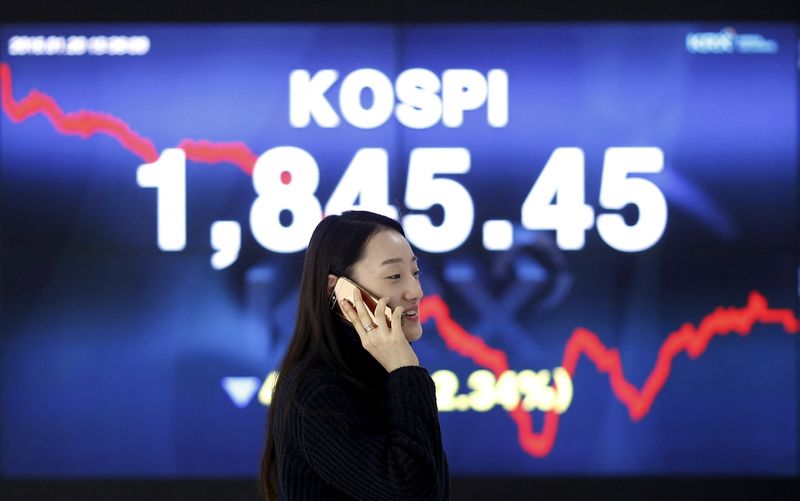By Gaurav Dogra
(Reuters) - Foreigners resumed selling in Asian equities ex-China stocks in September as investors were deterred by U.S. interest rate hikes, a firmer greenback and a weaker regional growth outlook.
Data from stock exchanges in South Korea, India, Taiwan, the Philippines, Vietnam, Indonesia, and Thailand showed that foreigners sold equities worth a net $8.83 billion last month - their first monthly selling since June.
The regional equities have so far faced total outflows of $69.7 billion in the first three quarters of the year, a massive jump in outflows of $47.63 billion faced in 2008, when the global financial crisis occurred.
Graphics: Monthly foreign investment flows in Asian equities https://fingfx.thomsonreuters.com/gfx/mkt/gdpzyzmmlvw/Monthly%20foreign%20investment%20flows%20in%20Asian%20equities.jpg
Last month, the U.S. Federal Reserve raised its benchmark interest rate by 75 basis points, marking the third such hike in a row. Analysts expect the U.S. central bank to keep hiking rates to tame rising inflationary pressures.
The region grapples with mounting inflationary pressures, interest rate hikes, and slowing economic growth, said Mark Haefele, chief investment officer, UBS Global Wealth Management, and added that aggressive U.S. rate hikes have also hurt the region's currencies and its export markets.
Goldman Sachs (NYSE:GS) cut the region's 2022 and 2023 EPS growth by 2 percentage points (pps) and 3 pps respectively at the end of last month, citing the negative impact of rising rates, a stronger dollar, and slower growth on earnings.
Outflows from tech-reliant South Korea and Taiwan last month jumped to a three-month high of $1.8 billion and $5.3 billion, respectively.
India and Thailand witnessed outflows worth $903 million and $653 million, respectively, after each seeing inflows in the previous two months.

Foreigners were also net sellers of equities in the Philippines and Vietnam markets last month. On the other hand, Indonesian equities gained small inflows of $209 million.
"The cloudy outlook on economic conditions and firm policy stance from the Fed, risk sentiments may still lean towards some caution, which may lead to a lukewarm inflow for Asian equities in the near term at best," said Yeap Jun Rong, a market strategist at IG.